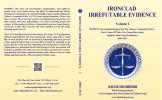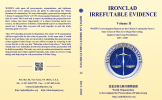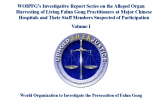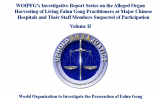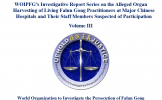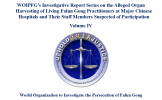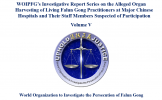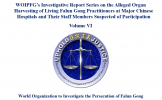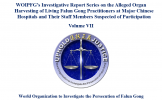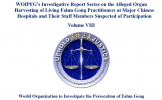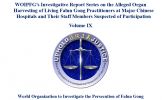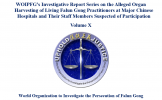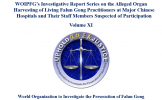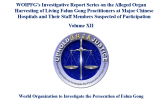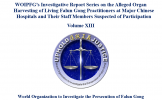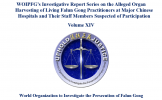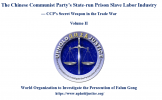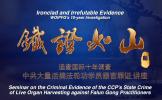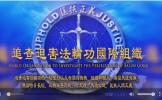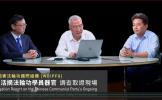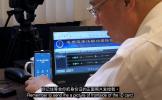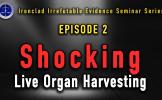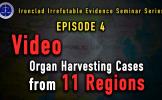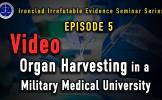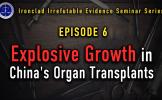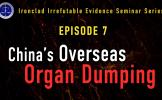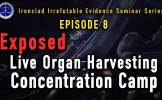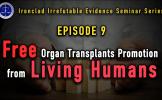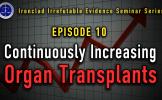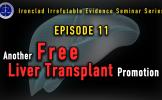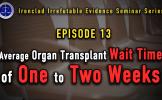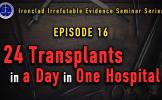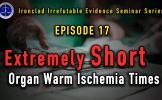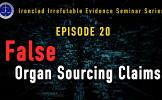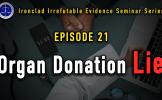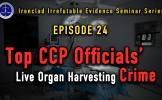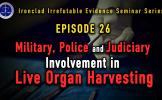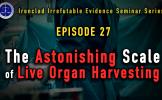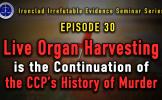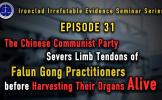Chapter Eight: The CCP’s Lies about Organ Transplants
Summary: This chapter systematically reviews the series of means adopted by the CCP over more than a decade, in order to cover up its crimes of live organ harvesting from Falun Gong practitioners: from denying the use of organs from executed prisoners, to exposing it as a more palatable scandal of live organ harvesting from death row prisoners, to deleting and tampering online information, to hyping up organ donations in China, and finally to blaming the entire organ harvesting issue on Zhou Yongkang.
Since 2006, in the face of accusations by the international community of live organ harvesting of Falun Gong practitioners, the CCP has adopted a variety of means to repeatedly deny these accusations. At the very beginning, the CCP completely denied its use of organs from executed prisoners; later, it admitted to having used a small number of organs from executed prisoners; and finally, it admitted that China is the only state in the world to systematically use executed prisoners’ organs. In 2010, the CCP began a high-profile campaign to hype organ donations in China. On December 3, 2014, the former Vice Minister of the Ministry of Public Health, Huang Jiefu, announced, “China will stop using organs from executed prisoners by January 1, 2015”. On March 15, 2015, Huang Jiefu claimed that China’s shady organ issue is the responsibility of the sacked former Politburo Standing Committee member Zhou Yongkang.
Ironically, the above mentioned lies told by the CCP often later fell flat directly due to the CCP’s own contradictory denials. Afterwards, the CCP would start fabricating new lies again. Then, it would deny these lies once more. The sole purpose for tirelessly fabricating such lies is to try to cover up its crimes against humanity.
We would also like to remind our readers here that after 1999, in the CCP’s live organ harvesting of either Falun Gong practitioners or death row inmates, the highest executive bodies were the CCP’s “610 Office” organization and the Political and Legislative Affairs Committee (PLAC); and the highest decision-maker was Jiang Zemin himself. Therefore, under the policy of persecution against Falun Gong practitioners set by higher-level CCP officials, regardless whether the former Vice Minister of Health, Huang Jiefu, or the Foreign Ministry spokesman denied these crimes or announced any “decisions”, these could only be considered the CCP’s lies and the responsibility must rest on the Party as a whole.
Contents
I. The CCP Denied the Use of Organs from Executed Prisoners, Lying that China’s Organ Transplants come from Voluntary Donations
II. The CCP Admitted that “Very Few” Organs Came from Executed Prisoners and Invited People from Abroad to Visit China but Refused to Issue them Visas
III. The CCP Admitted that the “Majority” of the Organs were from Executed Prisoners, and They were “Used Systematically”
IV. Denying Investigation Evidence only to Self-incriminate: CCP’s Farce regarding Guangxi National Hospital’s Surgeon Lu Guoping
V. “Strictly Prohibit” Transplant Advertisements Online; Many Hospitals’ Online Information was Deleted and Tampered with
VI. The CCP has been Hyping Up Organ Donations in China
1. More than a decade ago, the number of executed prisoners “had already started declining at an annual rate of 10%”, proving that the organ source in China after 2002 was abnormal
2. Huang Jiefu: “Executed prisoners’ organs have been systematically and forcibly removed, and this continues today.”
3. Associating Zhou Yongkang’s Crimes with Executed Prisoners’ Organs is Self-contradictory
VII.Huang Jiefu’s Statement “China will Stop Using Organs from Executed Prisoners by January 1, 2015” had neither Legal Effect nor Enforceability
1. Huang Jiefu has no authority to make promises on such a policy
2. The several organ transplant committees headed by Huang Jiefu have no executive power or clear professional affiliation
3. If the CCP really intends to stop the use of executed prisoners’ organs for transplants, it would be more effective to repeal the relevant regulations and provisions, which are still in effect
I. The CCP Denied the Use of Organs from Executed Prisoners, Lying that China’s Organ Transplants come from Voluntary Donations
In June 2001, Wang Guoqi, a Chinese doctor applying for political asylum in the United States, provided details regarding his involvement in the systematic removal of organs from executed prisoners in China. The Chinese Ministry of Foreign Affairs spokesman, Zhang Qiyue, denied the allegation and called Wang’s statements “vicious and hurtful lies.” Zhang Qiyue added, “China strictly prohibits sales of human organs. The organs used for transplant purposes were all from voluntary donations.”
The CCP’s mouthpiece Xinhua Net published on July 4, 2001, an article titled “Tianjin Armed Police Hospital: Organ Transplants from Executed Prisoners Allegations are totally False", denying Wang’s allegations on the official record[767].
II. The CCP Admitted that “Very Few” Organs Came from Executed Prisoners and Invited People from Abroad to Visit China but Refused to Issue them Visas
On March 9 and March 17, 2006, two witnesses independently revealed to The Epoch Times state-sanctioned live organ harvesting from Falun Gong practitioners, who were held in a secret concentration camp in Sujiatun District, Shenyang City, Liaoning Province. This concentration camp was said to be located under the Liaoning Provincial Thrombosis Hospital of Integrated Chinese and Western Medicine. Since 2001, approximately 6,000 Falun Gong practitioners were said to have been held in this camp. After the practitioners’ organs, such as kidneys, livers and corneas, were removed, their bodies were burnt immediately to destroy the evidence[768].
After remaining silent for 20 days, during a routine press briefing on March 28, 2006, Qin Gang, spokesman for the Ministry of Foreign Affairs, denied allegations of the existence of the Sujiatun concentration camp. However, Qin Gang admitted that China was “using organs from executed prisoners for transplants,” although saying, the practice was “very isolated, and with the consent of the executed prisoners.” Additionally, Qin Gang invited foreign journalists to “go (to Sujiatun) and see whether there is an underground camp.[769]”
On April 10, 2006, Mao Qun’an, the spokesperson for the Ministry of Health, echoed Qin Gang, the spokesperson for the Ministry of Foreign Affairs, on a Ministry of Health routine press conference. He said, “The transplant organs in China mainly come from voluntary donations. The use of organs from executed prisoners is very rare, and there must be consent from the prisoners or the families.[770]”
The core issue of the Sujiatun concentration camp exposure was that Falun Gong practitioners were being killed for their organs, not the sale of executed prisoners’ organs. The CCP has never addressed or responded to the accusations of its live organ harvesting of Falun Gong practitioners.
Although Qin Gang, the spokesperson for the Ministry of Foreign Affairs invited foreign journalists to go to Sujiatun, the Chinese regime’s embassies and consulates rejected all visa applications from media personnel and independent investigators. On June 2, 2006, Canadian international human rights attorney, David Matas, and former Canadian Secretary of State, David Kilgour, sent a letter to the Chinese Embassy in Canada regarding their plans of an independent investigation inside China. They did not get any reply for three weeks. When they did meet with an Embassy employee three weeks later, their requests were simply ignored[771]. Coalition to Investigate the Persecution of Falun Gong (CIPFG) member, Xu Lin, a Sound of Hope senior reporter, followed the normal visa application procedure to apply for a Chinese visa on April 19, 2006. The application was rejected by a Consul at the Chinese Consulate in Sydney, Australia[772].
III. The CCP Admitted that the “Majority” of the Organs were from Executed Prisoners, and They were “Used Systematically”
Four months prior to accusations of the CCP harvesting organs from Falun Gong practitioners, Huang Jiefu had already sent a message to the international community. During the November 2005 World Health Organization West Pacific Conference held in Manila, Philippines, Huang Jiefu, on behalf of the Chinese Party state, stated: “In China, about 2,000 liver transplants and 6,000 kidney transplants are performed each year. The majority of the organs are from executed prisoners.[773]” As Vice Minister of Health, and a transplant surgeon, Huang Jiefu knew very well that China would have to explain, sooner or later, the explosive growth of transplant organs.
However, the Sujiatun exposure took place suddenly, leaving the CCP unprepared. It seems that while trying to destroy the evidence, the CCP Central ordered the spokespersons from the Ministry of Health and the Ministry of Foreign Affairs to contradict Huang Jiefu’s earlier statement.
On March 10,2006,the WOIPFG announced the establishment of theInternational Committee to Investigate Sujiatun Concentration Camp[774].
On March 14 and March 30,2006, the WOIPFG published the “Investigative Report on the Live Harvesting of Human Organs from Abducted Falun Gong Practitioners at the Sujiatun Concentration Camp”[775],[776]. The investigation report confirmed that “the Liaoning Provincial Thrombosis Hospital of Integrated Chinese and Western Medicine” illegally set up crematories and allegedly burned bodies to destroy evidence; there exists an unusually large live organ donor group in Shenyang; Sujiatun concentration camp is not unique, and in many parts of China, a large number of cases of organ harvesting from live Falun Gong practitioners for transplants have been discovered.
On April 16,2006,the WOIPFG published the “Investigative Report on Harvesting Organs from Live Falun Gong Practitioners all over China”[777]. The investigation confirmed that in many provinces and cities across China, organ transplant facilities, including most of the military and armed police hospitals, are alleged to have harvested organs from living Falun Gong practitioners for organ transplants.
In July 2006, David Matas and David Kilgour released their investigation results, confirming the allegations of organ harvesting from Falun Gong practitioners in China[778]. The report generated substantial attention in the international community. As more and more evidence of organ harvesting from live Falun Gong practitioners was exposed, the international community requested the CCP regime to make its source of transplant organs public. Under such pressure, the CCP authorities started to voluntarily admit that China was the only country where organs from executed prisoners were systematically removed for organ transplants. The regime has been clinging to this statement since September 2006.
On September 28, 2006, the Ministry of Foreign Affairs spokesperson, Qin Gang, contradicted his earlier statement from March and admitted that prisoners’ organs were indeed used and were used with the permission of the government’s guidelines. Qin said, “In our country, we use executed prisoners’ organs very cautiously, and under strict guidelines.[779]”
On November 14, 2006, Huang said at a transplant conference in China, “In our country, the majority of organs for transplant were from donated corpses, part of which came from traffic accident victims and families[780]”. In China, organs from executed prisoners have all been categorized as “donated after death.” Huang’s statement implied that the majority of organs used for transplant are from executed prisoners.
In August 2008, Huang Jiefu published in the world’s leading medical journal The Lancet an article titled “Government policy and organ transplantation in China”. In the article, he wrote, “In China, more than 90% of transplanted organs are obtained from executed prisoners.[781]”
In his November 2011 article published in The Lancet, Huang Jiefu stated that China is the only country in the world that systematically uses organs from executed prisoners for organ transplant.[782]”
IV. Denying Investigation Evidence only to Self-incriminate: CCP’s Farce regarding Guangxi National Hospital’s Surgeon Lu Guoping
The investigative report by David Matas and David Kilgour published some phone investigation recordings, including one between a WOIPFG investigator and Surgeon Lu Guoping at Guangxi National Hospital. Lu Guoping admitted in the phone recording that Falun Gong practitioners’ organs had been used for organ transplants[783]. To deny these allegations, the CCP ordered the Hong Kong-based “overseas CCTV” - Phoenix TV – to produce a special program called “Investigation on the Davids’ Investigation Report”. Then, the program was made into CDs to be distributed abroad by the CCP’s embassies. In the TV program, the CCP asked Lu Guoping to make an appearance to deny the phone recording of his own remarks. When Phoenix TV was interviewing Lu Guoping in the program, Lu acknowledged that he received the phone call from an investigator, admitted that he was asked the questions in the recording, but denied that he said the answers in the recording.
However, David Kilgour and David Matas both believe that this interview actually provided new evidence. Prior to this, the main question people asked about this phone recording was: is the person that answered the phone really that of doctor Lu Guoping? These two investigators said on August 22, 2008, when they were presenting new evidence to the Canadian media, that in the videotaped interview with Phoenix TV, this doctor acknowledged that he was the person in the investigative phone recording; and the video was being distributed by Chinese embassies and consulates. Thus, the investigators believe that the authenticity (of Lu Guoping receiving the investigative phone call) was accepted by the CCP government.
In the TV program titled “Follow-up Reports on the CCP’s Stealing Organs of Falun Gong Practitioners” produced by NTDTV, there is a segment of Lu Guoping’s interview on Phoenix TV. (Please visit NTDTV’s website for the video clip: http://www.ntdtv.com /xtr/gb/2009/04/08/a278863.html#video)
The readers can compare Lu Guoping’s phone conversation recording with his TV interview. By listening to his local accent, the reader can judge for yourself whether the voice in the investigative phone recording was indeed his or not. Lu Guoping has a very strong regional accent and a severe stammer. Currently, synthetic voices haven’t been able to mimic human voices perfectly, just as robots cannot behave like real humans.
Thus, the CCP inadvertently gave an implied admission to organ harvesting from Falun Gong practitioners through the voice of one of its doctors.
Lu Guoping (Interviewed by Phoenix TV): She (i.e. the WOIPFG investigator) asked me whether my hospital used those organs of Falun Gong practitioners or not. I told her that I was not involved in this type of surgery, so I didn’t know where the organs they used came from. So in this regard, I couldn’t answer her question.
(Investigative phone recording) Investigator: Have your classmates told you that they (used the organs) from Falun Gong (practitioners)?
(Investigative phone recording) Lu Guoping: Some were from Falun Gong (practitioners), some were donated by the families.
(Investigative phone recording) Investigator: Oh. Now, I want to find this type (of organs) from Falun Gong (practitioners) for my child. Do you expect him to be able to help me find it?
(Investigative phone recording) Lu Guoping: (He) can certainly find it.
Lu Guoping (Interviewed by Phoenix TV): They wrote in this report that (I was asked), “the Falun Gong practitioner donors you used previously were taken from the prison or the detention center?” The report said that my answer was “the prison”. However, I didn’t answer like that. My answer was that our hospital did not have this qualification, and I myself had no such qualification, so it was impossible for us to take any organs.
(Investigative phone recording) Investigator: For (the Falun Gong practitioner source) you used previously, where did you find them? From the detention center or the prison?
(Investigative phone recording) Lu Guoping: (They were) found in the prison.
(Investigative phone recording) Investigator: Prison. The kind (of organs) he has are all (from) healthy Falun Gong (practitioners), right?
(Investigative phone recording) Lu Guoping: Right, right, right. (We) must select good ones, to be able to do it. Because to do this kind of things, you need to ensure the quality.
Lu Guoping (Interviewed by Phoenix TV): There was a second question, where she asked, “then do you have to go to prisons yourselves to select (organ donors)? The report said that my answer at that time was “yes, for sure I have to select (them)”. This question was simply not asked. It did not even take place.
(Investigative phone recording) Investigator: Then you have to go to prisons yourselves to select (organ donors), right?
(Investigative phone recording) Lu Guoping: Right, right, right. For sure I have to select (them).
(Investigative phone recording) Investigator: What if he does not let you to draw his blood (for testing) for selection?
(Investigative phone recording) He certainly will allow me.
(Investigative phone recording) Investigator: How can he allow it?
(Investigative phone recording) Lu Guoping: There are the judicial policemen. What are you afraid of? This is something you really have no need to worry about. They will handle it.
(Investigative phone recording) Investigator: No, I know (I don’t have to worry about it). Would he know that you would get his organs for organ transplant? Would he know?
(Investigative phone recording) Lu Guoping: He does not know.
(Investigative phone recording) Investigator: He does not know. Then (you) wouldn’t let him know, right? If he knew, he would not allow you to draw his blood, right?
(Investigative phone recording) Lu Guoping: Right, right, right, right, right.
(Investigative phone recording) Investigator: How could you convince him? If he asks you, “why do you draw my blood”, how do you respond?
(Investigative phone recording) Lu Guoping: They will have ways to handle this. Anyway, this is not a problem to concern you.
V.“Strictly Prohibit” Transplant Advertisements Online; Many Hospitals’ Online Information was Deleted and Tampered with
During the national organ transplant conference held on November 14, 2006, Huang Jiefu said, “Publication of any medical advertisements regarding human organ transplants... is strictly prohibited…Advertisements of short waiting times and ample donor organs are strictly prohibited.[784]”
The online advertisements were mostly from top-rated Grade A Class 3 civilian, military and armed police force hospitals. The fact that they dared to put up such bold advertisements online implies that they had easy access to and control over a large organ bank. Although the advertisements were removed to cover up this, the live organ harvesting did not stop.
On the surface, the CCP ordered the hospitals to cancel their organ transplant advertising. However, as our large data analysis has indicated, a large amount of information on the websites of various organ transplant hospitals, which are suspected to have harvested organs from living Falun Gong practitioners, was deleted and modified, before Huang Jiefu released his message. Considering the fact that the CCP monitored the overseas allegations of organ harvesting through the “610 Office” organization, which is responsible for the persecution, the only conclusion we can draw from this is that the CCP systematically arranged the hospitals accused of organ harvesting to delete and modify their online information.
VI.The CCP has been Hyping Up Organ Donations in China
After 2010, on the CCP’s behalf, Huang Jiefu made appearances to begin hyping up organ donations in China. However, during this process, the CCP has often unwittingly exposed its true nature.
1. More than a decade ago, the number of executed prisoners “had already started declining at an annual rate of 10%”, proving that the organ source in China after 2002 was abnormal
On March 7, 2013, Huang Jiefu told Southern Metropolis Daily in an interview, “More than a decade ago, the number of prisoners being executed in China had already started to decrease by an annual rate of 10% every year. Now, there are very few executed prisoners.[785]”
Huang Jiefu didn’t make any remarks regarding the decline of executed prisoners’ numbers until 2013. This is to highlight the organ shortage, and to serve as a contrast to the effects of the organ donation system and the organ transplant guidelines.
Previously, China’s number of organ transplants had been increasing for the past decade. Huang Jiefu had always been saying that executed prisoners’ organs were the main source for the increasing organ transplants year after year. If this statement was true, the number of executions should have been going up, as well.
However, after mentioning that the numbers of organ transplants had been increasing for more than a decade, Huang Jiefu admitted in 2013 that the number of executed prisoners had been decreasing since 2002 (or even earlier) by 10% each year. So, the explosive growth in organ transplants took place after the number of executed prisoners’ organs declined. This implies that there is a large bank of people, who are not on death row, but are secretly detained as unwilling “organ donors.” After they were used as “organ donors”, they disappeared.
2. Huang Jiefu: “Executed prisoners’ organs have been systematically and forcibly removed, and this continues today.”
On March 1, 2014, Huang Jiefu announced the merging of two committees that he was in charge of, the Organ Transplant Committee (OTC) and the China Organ Donation Committee (CDOC), into one committee. Huang also revealed the fact that forcibly removing executed prisoners’ organs had been done systematically, and as of 2014, there were also executed prisoners and their families unknowingly “donating” the prisoners’ organs.
Hong Kong’s Mingpo quoted Huang Jiefu as saying, “Why do we admit (the removal of executed prisoners’ organs)? Because we are systematically donating organs with the executed prisoners, and because there were no donated organs by civilians. No matter how we try to hide it, we can’t.”
But in March 2014 when asked if the prisoners’ or their families’ consent was obtained, before the prisoners’ organs were donated, Huang contradicted his own words from nine months before and admitted: “It [the consent] has not obtained. But we are reforming. This (new committee) was just set up. This will be my main task. I must follow all the procedures to make it happen.[786]”
Huang Jiefu was in charge of the new committee created through merging the two previous committees that he had been in charge of for at least seven years. The tasks he performed were mainly publishing rules, regulations and so on. How did the merged committee become Huang’s “main task”? What had Huang Jiefu been doing over the past 7 years?
3. Associating Zhou Yongkang’s Crimes with Executed Prisoners’ Organs is Self-contradictory
On March 15, 2015, Phoenix TV published an article titled “Huang Jiefu: Citizens’ Voluntary Organ Donations are the Continuation of Life under the Sun”. The article said that former Vice Minister of Health, Huang Jiefu, mentioned on Phoenix TV’s “Charity China” program that organ transplants with death row prisoners’ organs had formed a dirty chain of interest, and only Zhou Yongkang’s downfall finally broke this chain[787].
The CCP’s systematic use of organs from executed prisoners is based on legislation enacted in 1984. Whereas Zhou Yongkang was appointed the CCP’s Public Security Minister in December 2002, and he was appointed the secretary of the PLAC in 2007. Therefore, blaming the large-scale use of organs from executed prisoners on Zhou Yongkang is not justified. In fact, Zhou Yongkang had loyally followed Jiang Zemin as the highest commander in the persecution against Falun Gong practitioners and in organ harvesting from living Falun Gong practitioners. In April 2012, the CCP Central Committee’s Political Bureau Standing Committee member Li Changchun said, when answering a WOIPFG investigator on the phone, “You ask Zhou Yongkang” and “Zhou Yongkang is in charge of this specifically. He knows it.” For the recorded evidence, please see chapter II of this report. Zhou Yongkang was guilty, but he was also clearly a fall guy, - a contradiction which Huang Jiefu exploited to improve the CCP’s image in the West.
VII.Huang Jiefu’s Statement “China will Stop Using Organs from Executed Prisoners by January 1, 2015” had neither Legal Effect nor Enforceability
On December 3, 2014, China’s former Vice-Minister of Health, Huang Jiefu, announced that “China will stop using organs from executed prisoners by January 1, 2015.[788]” However, this is not the CCP’s policy, or a piece of legislation that has any legal effect. This is another hoax to cover up the CCP’s evil crimes of organ harvesting from living Falun Gong practitioners.
1. Huang Jiefu has no authority to make promises on such a policy
In terms of the CCP’s commercial use of organs (from death row inmates and Falun Gong practitioners), after 1999, the highest executive bodies are the CCP’s “610 Office” organization and the PLAC; and the highest decision-maker is Jiang Zemin himself. So, a petty former Vice-Minister of Health, Huang Jiefu, has no authority to make any decisions over this. Nor is it clear that Huang Jiefu has any authority over the military hospitals today.
2. The several organ transplant committees headed by Huang Jiefu have no executive power or clear professional affiliation
The inference of the CCP intending to avoid these organ transplant committees can be proved by the National Health and Family Planning Commission’s official website. The notice of establishing the China Human Organ Donation and Transplantation Committee in March 2014 was jointly issued by the National Health and Family Planning Commission and the Red Cross Society of China. The notice was posted on the National Health and Family Planning Commission’s website[789]. On this commission’s website, the institutions are classified into four categories, including "commission institutions”, “directly affiliated units and contact departments”, “business executive social organizations” and “local health and family planning departments”. The China Human Organ Donation and Transplantation Committee does not belong to any of the above four categories.
In 2008, Huang Jiefu claimed that national organ transplant regulatory agencies would be set up in China[790]. However, the China Organ Donation Committee, which had been set up for almost a year, was not among the State Department agencies. This body in charge of China’s large organ transplant industry did not have its own website, and its administrative or professional categorization was unclear. After the “Government Online Project” started to be implemented more than a decade ago, even the lowest-level government administrative agencies, townships and sub-district offices now have their own official websites. The China Human Organ Donation and Transplantation Committee with only Huang Jiefu hogging the limelight is more like an unfunded “briefcase company” with no staff or office.
3. If the CCP really intends to stop the use of executed prisoners’ organs for transplants, it would be more effective to repeal the relevant regulations and provisions, which are still in effect
Regarding the use of executed prisoners’ organs for transplants, the CCP issued an “Interim Provision on the Use of Cadavers and Organs from Executed Prisoners” in 1984. The “Interim Provision” was jointly issued by the Supreme People’s Court, the Supreme People’s Procuratorate, the Ministry of Public Security, the Ministry of Justice, the Ministry of Health and the Ministry of Civil Affairs, and it is still in effect today[791].
On March 21, 2007, the “Regulations on Human Organ Transplantation” was promulgated by the State Council. It is not a law, nor does it repeal the 1984 Interim Provision[792].
If the CCP would want to adjust its policy on the use of executed prisoners’ organs, directly repealing the 1984 “Interim Provisions” would be more effective than instructing an unauthorized former Vice-Minister of Health to make a series of speeches.
From a legal perspective, the CCP has not done anything to change its practice of using the organs from executed prisoners for transplants.
In summary, it can be seen that from beginning to end, the CCP’s purpose is to cover up a crime of immense proportions – the systematic organ harvesting from living Falun Gong practitioners.
References:
[767]Tianjin Armed Police Hospital: allegations that organ harvested from executed prisoners are totally fabricated. XinhuaNet,July 4, 2001. Republished on"news.sina.com.cn"
[768]A concentration camp in Shenyang installed acremator and sold Falun Gong practitioners' organs." The Epoch Times" March 10, 2006.
New witness confirms existence of Chinese Concentration camp at Sujiatun, says organs removed from living victims."The Epoch Times" March 17, 2006.
Review of Sujiatun story, the CCP said it does not exist. "The Epoch Times" June 22, 2006.
[769]China denied harvestingorgans from executed prisoners." Radio Free Asia", March 29, 2006.
Chinese Foreign Ministry refuted the statement that Sujiatun labor camp harvested human organs. "Boxun News" March 29, 2006.
[770]The Ministry of Health refuted the statement that China harvests organs from executed prisoners for transplants. "xinhuanet.com" April 10, 2006.
[771]China Embassy Dodging Organ Harvesting Probe, Says Ex-MP. The Epoch Times, June 29, 2006.
[772]Sound of Hope demanded Qin Gang to explain that Sound of Hope reporter Xu Lin was denied visas. Soundofhope.org, April 20, 2006.
[773]Meeting Report: Consultation Meeting on Transplantation with National Health Authorities in the Western Pacific Region, by WHO Western Pacific Region
[774]Statement from the International Committee to Investigate Sujiatun Concentration Camp."WOIPFG"
http://www.zhuichaguoji.org/node/675 (Chinese)
http://www.upholdjustice.org/node/162 (English)
[775]Investigative Report on the Live Harvesting of Human Organs from Abducted Falun Gong Practitioners at the Sujiatun Concentration Camp (Part 1) "WOIPFG"
http://www.zhuichaguoji.org/node/786 (Chinese)
http://www.upholdjustice.org/node/161(English)
[776]Investigative Report on the Live Organ Harvesting from Falun Gong Practitioners at the Sujiatun District Traditional Chinese Medicine Hospital (Part II)"WOIPFG"
http://www.zhuichaguoji.org/node/680 (Chinese)
[777]Investigative Report on Harvesting Organ from Live Falun Gong Practitioners all over China."WOIPFG"
http://www.zhuichaguoji.org/node/699(Chinese)
[778]David Matas, Esq. and Hon. David Kilgour, Esq., Bloody Harvest-Revised Report into Allegations of Organ Harvesting of Falun Gong Practitioners in China. January 31, 2007
[779]Foreign Ministry spokesman QinGang answered questions from reportersata regular press conference. "Websiteof Chinese Consulate Generalin San Francisco", September 28, 2006.
[780]Vice Minister Huang Jiefu’sSpeech at the National Human Organ Transplant Clinical Application Management Summit."Health Affairs Bulletin, November 14, 2006. Republished on the website of People's Republic of China National Health and Family Planning Commission.
[781]Government policy and organ transplantation in China.www.thelancet.com Vol 372 December 6, 2008.Published Online October 20, 2008
[782]A pilot program of organ donation after cardiac death in China.Lancet, November 11, 2011.
[783]Investigative recording excerpts revealing the organharvesting from livingFalun Gong practitioners in Mainland China."WOIPFG"
[784]Vice Minister Huang Jiefu’s Speech at the National Human Organ Transplant Clinical Application Management Summit." Health Government Bulletin, November 14, 2006. Republished on the website of People's Republic of China National Health and Family Planning Commission.
[785]Huang Jiefu thinks that it’s not ready to establish the relevant legislation, since ninety percent of brain death is not known by physicians. Southern Metropolis Daily, March 7, 2013. Republished on "China Organ Transplantation"
[786]Chinese high rank officials admitted that harvesting organs from executed prisoners for transplant has not been stopped." Ming Pao"March 11, 2014. Quoted on"WenxueCity"website.
[787]Huang Jiefu: Citizens’voluntary organ donation is the continuation of life under the sun.Phoenix Television, March 16, 2015.Republished on"Phoenix Net Information".
[788]Cheng Shuwen, Starting next year China will no longer make use of executed prisoners’ organs for transplantation. HuangJiefu, the Chairman of the ChinaHospital Association OPO Union,said that citizens’voluntarily donated organs will become the only channel for transplants. "Southern Metropolis Daily", December 5, 2014.
[789]Announcement of the National Health and Family Planning Commission and China Red Cross to establish the Commission of China Human Organ Donation and Transplantation. National Health and Medicine Publication No. 9 (2014)."Website of National Health and Family Planning, Medical Administration Authority"March 7, 2014.
[790]Huang Jiefu,Vice Minister of Ministry of Health, National Regulations to Organ Transplantation will be established.“BeijingNews” March 14, 2008. Republished on "xinhuanet.com".
[791]The Provisional Regulations on the use of bodies or organs of the executed prisoners, formulated by the Supreme People's Court, the Supreme People's Procuratorate, Public Security, Ministry of Justice, Ministry of Health, and Ministry of Civil Affairs. "Legislation and Regulation", Publishing Date: October 9,1984, Effective Date: October 9,1984.
[792]State Council, Human Organ Transplant Ordinance. Website of China Central Government (www.gov.cn), April 6, 2007.


